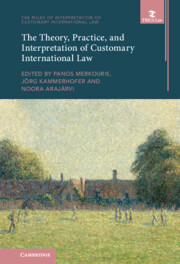59 results
Beyond the res judicata doctrine: The nomomechanics of ICJ interpretation judgments
-
- Journal:
- Leiden Journal of International Law / Volume 37 / Issue 1 / March 2024
- Published online by Cambridge University Press:
- 15 November 2023, pp. 206-227
- Print publication:
- March 2024
-
- Article
-
- You have access
- Open access
- HTML
- Export citation
Part IV - Interpretation of Customary International Law
-
- Book:
- The Theory, Practice, and Interpretation of Customary International Law
- Published online:
- 05 May 2022
- Print publication:
- 26 May 2022, pp 345-450
-
- Chapter
-
- You have access
- Open access
- HTML
- Export citation
Abbreviations
-
- Book:
- The Theory, Practice, and Interpretation of Customary International Law
- Published online:
- 05 May 2022
- Print publication:
- 26 May 2022, pp xviii-xxii
-
- Chapter
-
- You have access
- Open access
- HTML
- Export citation
Table of International Treaties, Documents and National Legislation
-
- Book:
- The Theory, Practice, and Interpretation of Customary International Law
- Published online:
- 05 May 2022
- Print publication:
- 26 May 2022, pp xxxiv-xlii
-
- Chapter
-
- You have access
- Open access
- HTML
- Export citation
Part III - The Practice of Customary International Law Across Various Fora
-
- Book:
- The Theory, Practice, and Interpretation of Customary International Law
- Published online:
- 05 May 2022
- Print publication:
- 26 May 2022, pp 229-344
-
- Chapter
-
- You have access
- Open access
- HTML
- Export citation
Bibliography
-
- Book:
- The Theory, Practice, and Interpretation of Customary International Law
- Published online:
- 05 May 2022
- Print publication:
- 26 May 2022, pp 530-573
-
- Chapter
-
- You have access
- Open access
- HTML
- Export citation
Index
-
- Book:
- The Theory, Practice, and Interpretation of Customary International Law
- Published online:
- 05 May 2022
- Print publication:
- 26 May 2022, pp 574-604
-
- Chapter
-
- You have access
- Open access
- HTML
- Export citation
Preface
-
- Book:
- The Theory, Practice, and Interpretation of Customary International Law
- Published online:
- 05 May 2022
- Print publication:
- 26 May 2022, pp xv-xvii
-
- Chapter
-
- You have access
- Open access
- HTML
- Export citation
Copyright page
-
- Book:
- The Theory, Practice, and Interpretation of Customary International Law
- Published online:
- 05 May 2022
- Print publication:
- 26 May 2022, pp iv-iv
-
- Chapter
-
- You have access
- Open access
- HTML
- Export citation
1 - Between Pragmatism and Disenchantment
- from Part I - The Theory of Customary International Law
-
-
- Book:
- The Theory, Practice, and Interpretation of Customary International Law
- Published online:
- 05 May 2022
- Print publication:
- 26 May 2022, pp 3-28
-
- Chapter
-
- You have access
- Open access
- HTML
- Export citation
Table of Cases
-
- Book:
- The Theory, Practice, and Interpretation of Customary International Law
- Published online:
- 05 May 2022
- Print publication:
- 26 May 2022, pp xxiii-xxxiii
-
- Chapter
-
- You have access
- Open access
- HTML
- Export citation
Part V - Customary International Law in the Practice of Domestic Courts
-
- Book:
- The Theory, Practice, and Interpretation of Customary International Law
- Published online:
- 05 May 2022
- Print publication:
- 26 May 2022, pp 451-529
-
- Chapter
-
- You have access
- Open access
- HTML
- Export citation
Part I - The Theory of Customary International Law
-
- Book:
- The Theory, Practice, and Interpretation of Customary International Law
- Published online:
- 05 May 2022
- Print publication:
- 26 May 2022, pp 1-102
-
- Chapter
-
- You have access
- Open access
- HTML
- Export citation
Part II - Customary International Law as a Source of International Law
-
- Book:
- The Theory, Practice, and Interpretation of Customary International Law
- Published online:
- 05 May 2022
- Print publication:
- 26 May 2022, pp 103-228
-
- Chapter
-
- You have access
- Open access
- HTML
- Export citation
Contributors
-
- Book:
- The Theory, Practice, and Interpretation of Customary International Law
- Published online:
- 05 May 2022
- Print publication:
- 26 May 2022, pp ix-xiv
-
- Chapter
-
- You have access
- Open access
- HTML
- Export citation
Contents
-
- Book:
- The Theory, Practice, and Interpretation of Customary International Law
- Published online:
- 05 May 2022
- Print publication:
- 26 May 2022, pp v-viii
-
- Chapter
-
- You have access
- Open access
- HTML
- Export citation

The Theory, Practice, and Interpretation of Customary International Law
-
- Published online:
- 05 May 2022
- Print publication:
- 26 May 2022
-
- Book
-
- You have access
- Open access
- Export citation
5 - Doctrinal Scholarship
-
- Book:
- International Investment Law and Legal Theory
- Published online:
- 17 April 2021
- Print publication:
- 06 May 2021, pp 144-161
-
- Chapter
- Export citation
Table of Cases
-
- Book:
- International Investment Law and Legal Theory
- Published online:
- 17 April 2021
- Print publication:
- 06 May 2021, pp xv-xxiv
-
- Chapter
- Export citation
3 - Investment Precedents
-
- Book:
- International Investment Law and Legal Theory
- Published online:
- 17 April 2021
- Print publication:
- 06 May 2021, pp 43-67
-
- Chapter
- Export citation

